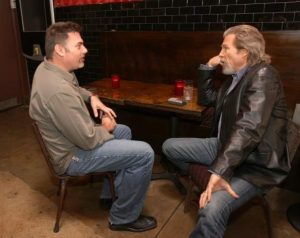It was 8:10 a.m. on Wednesday, April 17. Journalism students trickled into room 222, plugged in their earbuds, and joined a Google Meet featuring a special guest. From a loud and mysterious warehouse in Philadelphia was a bubbly and intense personality named Geoff Boucher.
Boucher grew up in Florida and attended the University of Florida, where he studied journalism. He moved to California to work for The L.A. Times shortly after college. With his “young legs,” he jumped at every story opportunity he could get and gained popularity amongst the staff. Through this job, Boucher garnered experience in various genres of journalism, such as crime, presidential elections, music, and television. He also published a book titled Two Badges: The Lives of Mona Ruiz, about a female gang member. Boucher reported for The L.A. Times for 21 years before resigning in 2012. Since then, he has worked for Entertainment Weekly and Deadline.

Peppered between his fascinating stories of interviewing A-list celebrities or visiting niche countries, Boucher offered critical advice for aspiring journalists.
“Keep ledes short and concise.”
Getting to the point is essential when writing. Ledes should only be one to two sentences because readers usually want their news quickly. They want to avoid digging through the story to reach the main point.
“Use many strong verbs.”
Using strong verbs adds dimension to stories, making them feel lively. The liveliness of verbs keeps readers engaged and makes them feel like they are experiencing the story firsthand. Say no to “is” and “was” and “are” and “were.”

“Stay nimble and current with your writing, but always remember, revisiting fundamentals is key.”
Although everyone hates it, returning to the basics will take one’s writing to the next level. NoRedInk is an excellent tool for strengthening writing and grammar skills. So, next time your English teacher tells you to do the NoRedInk assignment, do the assignment.
“Before you can write it, you have to read it.”
Being a good writer takes time and effort. Becoming a good writer does not happen overnight. One has to read books and stories of various genres to learn different writing styles, to master sentence structures, and to expand vocabulary.
“You don’t work for the editors; you work for the readers.”
While the editors are the ones who edit and approve stories, it’s important to appeal to the readers’ interest. Ultimately, readers are the biggest critics. Once the story is published, readers will decide whether it is good or bad.
As the Google Meet came to a close, Boucher’s words of wisdom stuck with the journalism students of Room 222. His thrilling stories and snippets of advice made the 58-minute period go by in the blink of an eye, leaving a lasting impact on the student’s journalistic journeys.














































































































































